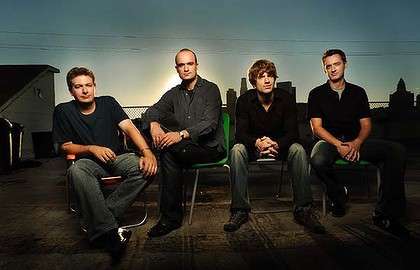|
Back
An Anthology of Modern Music New York
Le Poisson Rouge, 162 Bleecker Street
01/05/2011 -
Pierre Boulez: Une page d’éphéméride (New York premiere)
Claude Vivier: Pianoforte (New York premiere)
Daniel S. Godfrey: Night Walk (New York premiere)
Thomas Adès: Mazurkas, Op. 27 – Piano Quintet
Kaija Saariaho: Ballade – Prelude
Oliver Messiaen: Selections from Eight Préludes
Igor Stravinsky: Three Pieces for String Quartet
Gloria Cheng (Piano), Calder Quartet: Benjamin Jacobsen, Andrew Bulbrook (Violins), Jonathan Moerschel (Viola), Eric Byers (Cello)

G. Cheng (© Gloria Cheng)
Gloria Cheng is a pianist who apparently believes that no music existed before the late 20th Century. She can whizz through Pierre Boulez, take the most difficult Elliott Carter in her stride, play Messiaen like it’s Haydn, and give more obscure composers a good try. As proficient as Ms. Cheng may be, she never makes works sound difficult. She is charming in her explanations, as eloquent as possible on the keys, and seems oblivious to challenges.
This, though, may not be all as good as it sounds. In her performance to a sellout crowd at Le Poisson Rouge last night, she played the works of seven composers (two of whom were in attendance), and wowed the knowledgeable listeners with every work. Whether lyrical or dissonant, enigmatic or ephemeral, Ms. Cheng played with the same amount of commitment and concentration. Yet at the end of the evening it took some imagination to remember which were brilliant and lasting, and which were minor and pleasant.
With two exceptions. The final two works were both by the great British composer Thomas Adès, one for solo, the other with the Calder Quartet. Both of them were so interesting by themselves that the other pieces faded into a faraway memory.

T. Adès at Poisson Rouge (© Herring Rollmop)
Three Mazurkas had three entirely different moods, they were rhythmic homages fo Chopin, yet they all exemplified a British composer who could be compared to a Metaphysical Poet. In all three, he took a relatively simple idea, and almost created some variations/developments. But not quite. For in the initial bluesy, laid-back (Ms. Cheng’s words) mazurka, one could hear the resonances of Chopin in three-quarter time, but shadows of an easy going theme slightly transformed. The third was most entrancing, a fractured theme over many octaves, repeated again yet more sensitively.
The second, was described as Adès’ Flight of the Bumblebee. But the latter was a whirring melody. This was like a Metaphysical conceit, the crazy melody mutating into two or three melodies one or two notes off. A tour de force, yes, but with those little surprises to keep it on edge.
(Of course it was labeled Prestissimo. To quote Shakespeare on Metaphysical poets, “If it were Donne, t’were well that it were Donne quickly.”)

Calder Quartet (© Gordon Farrer)
Longer and even more puzzling was Adès’ Piano Quintet. One long movement starting with a simple “Do, Re, Mi” almost becoming a fugue. And now we have Adès almost cloning older composers. Was this a Schubert or Schumann piano solo that we heard, repeated with string figurations breaking it up? No, the composer says it was all original. It simply fit. More measures in a wild waltz rhythm seemed a parody of Ravel’s La Valse. But the Ravel itself is a fracturing of an older form, so Adès simply fractures it more.
But this was no clever pastiche à la Luciano Berio. Piano and quartet wandered in and out of classical harmonies with inevitability, as if Mr. Adès felt that such throwbacks were not conscious reversions but essential formations.
More than the Mazurkas, this is a piece I want to hear again. This first performance was delightful and surprising. The substance remains for another day.
The Calder Quartet played another work unknown to me, Stravinsky’s Three Pieces for String Quartet. Not much music, but what weird coloration!! At times, it sounded like a piano or harp, in the first movement, one of the violins plays above the bridge, with the sound of a trumpet. In the finale, you feel like the strings playing a Gregorian chant. And like Adès’ opening “Do Re Mi” the repletions are always intriguing.
Back to Ms. Cheng, and her four Messiaen Preludes. To her disadvantage, the complete eight preludes were played by Pierre-Laurent Aimard a few weeks ago. M. Aimard handled each of these early Debussy-like pieces like the most exotic fabrics. They were jewels, distinct, luscious, almost too delicate to hear.
Ms. Cheng played them quite beautifully, but one knew it instead of experiencing it. M. Aimard gave the tolling bells an indistinct nuance. Ms. Cheng made them sound like bells. M. Aimard took the impossible "Impalpable Sounds of Dreams" and made them drift. Ms. Cheng tried to make the sounds materialize.
Then again, M. Aimard had the sanctity of Carnegie Hall. I love Le Poisson Rouge, but somewhere between "Bells of Anguish" and "Tears of Farewell", a waitress was delivering sandiwch of hamburger, and potatoes of French fries.
Far more was on the program. The great Finnish composer Kaija Saariaho was represented by two lovely lyrical works, played oh so sensitively by Ms. Cheng. Daniel Strong Godfrey’s Night Walk was overlong, over-poetic, an updated Griffes or even Ibert. The first work was a fascinating atonal piece by Claude Vivier, one of whose claims to fame in being that, while working on an opera about Tchaikovsky’s death, he was murdered by a boyfriend.
Much, much to savor in Gloria Cheng’s concert. One would have wanted a respite, a few measures of Bach, a Frescobaldi chaconne. But Gloria Cheng goes her own way, and does it, admittedly with glorious finger work and an accomplished honest feeling.
Harry Rolnick
|